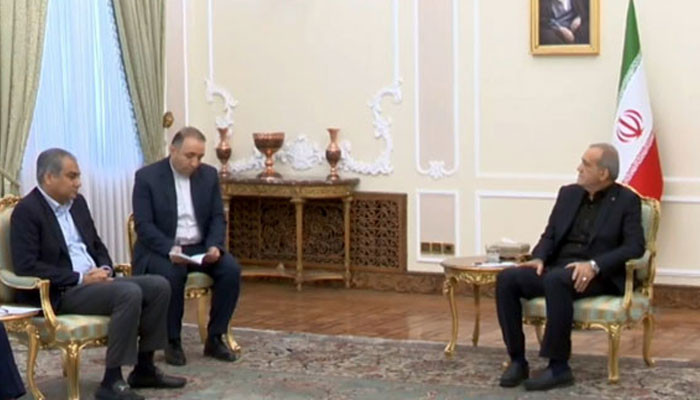Iranian President Highlights Unity Among Muslim Nations in Meeting with Interior Minister
During discussions with Interior Minister Mohsin Naqvi, Iranian President Masoud Pezeshkian stated that Iran places considerable importance on its relationship with Islamabad. He expressed gratitude for the support provided during the recent conflict against Israel.
President Pezeshkian cautioned that Israel is attempting to sow discord among Muslim countries, emphasizing the necessity for cohesion among Islamic nations. He also acknowledged the value of constructive conversations to improve cooperation between the two countries and expressed contentment with the existing connections between the neighboring states.
Furthermore, the Iranian President emphasized the significant potential for enhanced collaboration between Pakistan and Iran, conveying that his nation would always remember Pakistan’s assistance during the conflict with Israel.
Naqvi congratulated President Pezeshkian on achieving a notable triumph and acknowledged Pakistan’s backing of Iran, highlighting that Islamabad firmly denounced the aggression against Tehran on all platforms.
He highlighted that the Pakistani parliament was at the forefront in adopting a resolution condemning the conflict imposed on Iran and supported Iran’s right to self-defence.
The statements from both leaders follow a period of armed conflict between Israel and Iran, which began on June 13 after Israeli airstrikes on Iranian military, nuclear, and civilian locations. These strikes reportedly resulted in numerous deaths and injuries, according to Iran’s Health Ministry.
Subsequently, Tehran launched missile and drone attacks on Israel, causing casualties based on data from the Hebrew University of Jerusalem.
The conflict also involved the US bombing multiple Iranian nuclear facilities, with claims that these strikes effectively dismantled Iran’s nuclear capabilities.
The hostilities concluded with a ceasefire mediated by the US, commencing on June 24.
Regarding the nuclear issue, Tehran has indicated that its engagement with the International Atomic Energy Agency (IAEA) will evolve, expressing a desire for a diplomatic resolution to address concerns surrounding its nuclear program.
Iran stated that cooperation with the IAEA would continue but in an altered format, after formally ending its collaboration with the UN watchdog in early July.
Iran has partly blamed the IAEA for the attacks on its nuclear facilities in June, which Israel claimed were aimed at preventing Iran from developing nuclear weapons, an ambition Tehran has consistently denied.



Comments (0)
No comments yet. Be the first to comment!
Leave a Comment